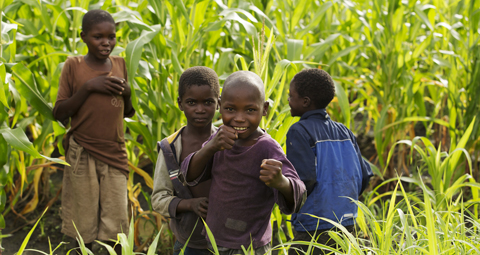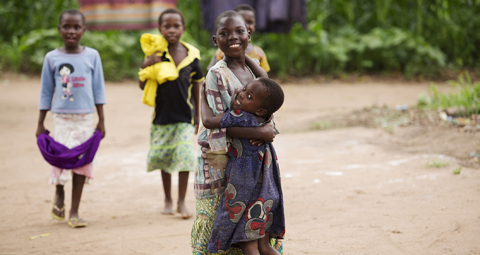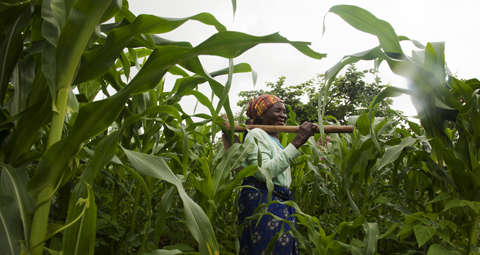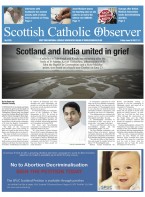BY Ian Dunn | March 24 | ![]() 0 COMMENTS
0 COMMENTS ![]() print
print
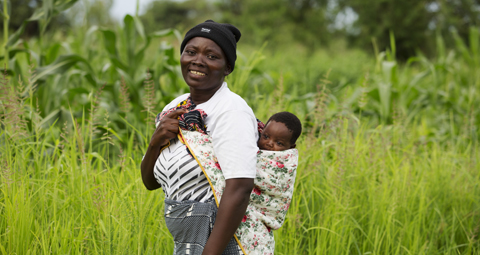
Raising up lives in Malawi
IAN DUNN reports from the African country on the life-saving work of SCIAF
Give, and it will be given to you, says the Bible—but generosity is out of fashion. 78 per cent of people want the UK Government to spend less on foreign aid according to a Survation poll this year. Nearly every day there’s a fresh story in the tabloids bemoaning that aid is being wasted on the undeserving. Across the Atlantic, Donald Trump has vowed to slash the US Aid budget.
Although on a personal level many remain incredibly generous to favoured charities, the amount given to animal, children and medical charities dwarfs that going to international development agencies like the Scottish Catholic International Aid Fund (SCIAF). When it comes to the world’s poorest, all too many of us just don’t care.
This is perhaps understandable. International development work is hard. Hard to do, hard to explain. There are no quick fixes. The world we live in seems to necessitate an awful lot of people at the bottom of the pile. That seems unchanging.
Perhaps we hope for too much. 30 years after Live Aid we are inured to images of African children in peril. We gave and gave and gave yet the problems never ceased. So why bother?
Giving people money did create dependency. Aid packages got more complex. Give a man a fish and he’ll eat for a day; give a man a fishing net and he’ll feed himself for a lifetime. But the reality of that is a long-term investment in local net-weaving programmes, acknowledging the risks of over-fishing, and understanding the already existing hierarchy that exist between different families of fishermen in the area.
That’s a much harder sell than the slogan.
In our busy, safe, life the problems of Africa can be impossible to imagine; too big. The vast, rolling scale of the place, the endless thundering roads, the 320 million still living on less than a dollar a day—an unconquerable number of people. Cynicism is easy.
A friend of mine—a wise, thoughtful, caring man—once said to me across a busy Glasgow bar: “Africa’s a basket case. It’s all just good money after bad. I don’t want to be heartless but there are too many problems and they are are just too big.
3,000 miles away, Margaret Simitoni had just one problem, but it was big one. Her daughter Selena had malaria. She lives on the Southern shores of Lake Malawi, Mangotchi. In 2015, heavy rains had flooded her village and her house. The youngest of her four children struggled in the wet and contracted malaria. Margaret is part of a village bank programme set up by SCIAF’s local partners in the Catholic Church. They get a seed fund and they can take out small loans to invest in farming equipment or cover emergency. She was able to borrow the money to take her daughter, aged just four at the time, to hospital.
“This is what I really appreciate about the project,” she said. “It saved my child and I’m happy today that I still see her. Without that money she would have died. This project has helped here a lot. With the bank we can achieve more. Women here who don’t do anything, we call them ‘goalkeepers,’ as like the goalkeeper they wait for things to happen to them. We are not goalkeepers. No one wants to be a goalkeeper.”
Violet Nolo lives about half a mile away. She has a similar story. She has six children. One of them, 15-year-old Nasimango, is disabled and cannot walk well.
“There was a time she had tuberculosis,” Violet said. “Without the village bank she would have died. Her life is hard, but we love her. I have HIV, my child is disabled. Life is not easy, but with the village bank we survive.”
This is what aid can do. It can’t ‘make poverty history’ but children who would have died, live. In our comfortable lives, it’s astonishing that just a little help is the difference between having a daughter and not.
For two years, Mary Jackson was the face of the SCIAF Wee Box campaign. She knows first hand the difference a little help can make. She was taught new farming techniques and introduced to new seeds and crops and even came to Scotland to talk about how she’d been helped. She says that traveling to Scotland was a very good experience, though ‘your country is cold and it rains all the time and there was no sima!’ [the local delicacy].
Afterwards, she came back to Chipolomba village in the South of Malawi and her life returned to normal—but better. “Life now is good. I can afford to send my children to school. We have good bedding. Life is much better than it was when we were stricken by hunger.”
But there was trouble ahead.
“When the floods came, my house collapsed,” she said. “ I was in the house, the rain was falling and then the wall was falling. The house, the toilets, they all collapsed. Our crop garden was washed away. But we were not devastated. We were with the village bank able to rebuild.”
The ability to survive a disaster: that’s a gift we can give. The ability for a child to live: that’s a gift we can give. Most of us would do anything to stop a family we know losing a child. That’s what we can give with international development—children that live.
Mary gestures to the tiny two-month old child on her back. “This is Sibongile. It means ‘thank you,’” she said. “I thank God for this child and I thank God she comes when life is good.”



